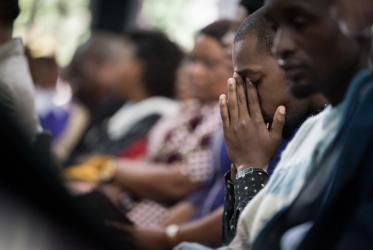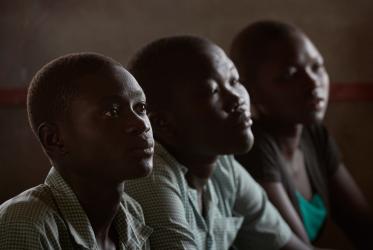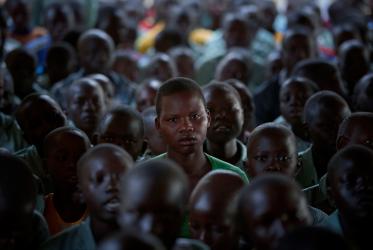Preamble
Being grateful for the longstanding and ongoing ecumenical support and commitment, we, the leaders and representatives of the Sudanese Churches under the umbrella of the Sudan Council of Churches (SCC) highly welcome the delegation of the Ecumenical Solidarity Visit under the leadership of Rev. Samuel Kobia, General Secretary of the World Council of Churches. Rev. Sam has been a personal friend to many of us for many years already, and played a crucial role as our ecumenical envoy to the IGAD Peace talks.
The visit of his delegation comes at the right time in the history of Sudan. While enjoying the silence of arms in many places, and while appreciating the efforts made so far, three years after the signing of the Comprehensive Peace Agreement (CPA) on January 9, 2005, nearly half way through the Interim Period until the agreed upon Referendum in 2011,
the people of Sudan and the Sudanese Church - being the voice of the voiceless and serving all God's people - are faced with tremendous tasks and challenges.
With the ongoing armed conflict and humanitarian catastrophe in Darfur and other parts of the country, newly emerging armed conflicts, particularly in Abyei, and the danger of a derailing CPA implementation, the just Peace and Reconciliation, we ever have been praying and working for, yet has to become a reality.
We kindly would like to bring some of our most pressing tasks and concerns to the attention of the ecumenical delegation, hoping that they can add in our voices in their deliberations with various stakeholders ahead of them.
These are in particular:
Comprehensive Peace Agreement (CPA)
The CPA provides the basis for a just and sustainable peace in Sudan. We give thanks to God for the Agreement and express our support for all efforts to ensure its full and timely implementation. We nevertheless recognize that many people within our communities remain ignorant about the content of the CPA and see an urgent need for its widespread dissemination.
In addition, we are concerned about the slow implementation and possible derailing of the agreement:
-
the census, postponed several times; and lacking the questions about ethnicity and religion
-
the elections, scheduled for 2009; not well prepared for yet
-
the lack of the set up of major commissions; (like referendum commission, reconciliation commission)
-
the in-transparent work of the CPA Assessment and Evaluation Commission;
-
laws not corresponding with the National Interim Constitution and The Interim Constitution in Southern Sudan;
-
the non - implementation of the Abyei Protocol;
-
the lack of the border demarcation;
-
the in- transparent share of oil revenues,
-
the environmental damages through the oil exploration and
-
the lack of compensation for those displaced by the oil and other commercial interests
-
a lack of mechanisms for National Reconciliation
The Referendum
We recognize the Referendum to be held in 2011 as being of key significance in the implementation of the CPA. Aware of the various aspirations of our communities, we consider it important for Church leaders to speak with a united voice on this issue. We affirm the right of every human being to decide his or her destiny, and accordingly we support the right of self-determination for the people of Southern Sudan to decide their future, whether for unity or separation. So far, our people are not sufficiently aware about the Referendum, there is no proper civic education on the issue and yet we see the danger that it might get spoiled on the way.
Darfur and other armed conflicts
We are deeply concerned about the ongoing armed conflicts, which are a tragedy in itself, but also a threat to the implementation of the CPA. Without solving these conflicts, there will be no just peace for anybody.
Disarmament and human security
Security sometimes seems to be granted only to those in power, but not to each and every human being. In particular the proliferation of small arms represents a serious danger within our communities. We recommend close co-operation between the Church, the Government and Community Leaders in addressing this.
Armed Forces and demobilised persons
We have identified an important responsibility of the Church towards the dignity and well-being of our armed forces and the demobilised soldiers. We recognize the effects, which many years of conflict have on those bearing arms, and the dangers coming along, if demobilised cannot find a place and income in the society.
Development
The peace dividends as promised by the government and international community after the signing of the CPA are yet to be seen in many places. Money pledged by the donor community already in 2005 is often not forthcoming. Especially the lack of health facilities, schools and clean water is a matter of great concern and one reason, why some of our people find it difficult to return home. In addition, we are concerned about the difficulty to access international and national funds, for both Sudanese Churches and Sudanese civil society organisations.
Returnees
Recognizing the difficulties faced by communities in the re-integration of returnees with different cultures, whether from Khartoum, East Africa or overseas, we propose that the Church co-operate closely with local governments in welcoming returnees and assisting in their re-integration. We furthermore appeal for wellorganised returnee programs instead of bringing people to areas were nothing is prepared for them.
Corruption
It is with dismay we are receiving reports about widespread corruption in the country. Like the first-vice President of Sudan, president of Southern Sudan Salva Kiir de Mayardit, we add our voice to the "No to corruption" campaign. Public resources need to be used for the benefit of all communities.
Land
Our people report about ongoing problems with the issue of land ownership and land grabbing.
Issues of cattle keeping and farming
We are concerned about reports of local conflicts between cattle keepers and farming communities. Memories of peaceful co-existence in earlier times assure us that such conflict can be avoided. We propose committed efforts to make it possible for both groups to pursue their livelihoods without damaging each other's interests.
Addressing Trauma and Threats of Revenge
We recognize as a serious threat to security and well-being the war's widespread legacy of trauma and the desire for revenge. The healing, reconciliation and peace building is process is a priority to safeguard a peaceful future.
Regionalism and Tribalism
We applaud the great progress made in the CPA, but see that we - within the country, within the communities but also within the churches - still experience many divisions along regions, ethnic lines, according to colour, according to tribe or through the absence of respect for our own languages. Can we recognize each other as created in the image of God, and as part of a single humanity blessed by God in order to fill the earth? We consider it our urgent priority to proclaim the Gospel message of love, and of mutual respect for one another as created in God's image and equal before God, our 'unity in diversity', expressed in the ecumenical life of the church.
Unity of the Church
We recognize a specific responsibility to work for the unity of the Churches and see a special urgency for joint working where churches risk being identified locally along tribal lines. We recognise the lack of capacity in many places to fulfil our manifold tasks. We see the difficulties our common council , the SCC, is facing, reassure our commitment to this our common important ecumenical body and urge the ecumenical family to stay with us in the process of transition and reconstruction.
Safeguarding the Church's position in Northern Sudan
While there may be uncertainty regarding the future political arrangements, we affirm that the Church has no boundaries. We commit ourselves to the unity of the Church of Sudan whether across one or two countries. Considering us as one ecumenical body, we appeal to all partners that we move together.
Khartoum, March 26, 2008




